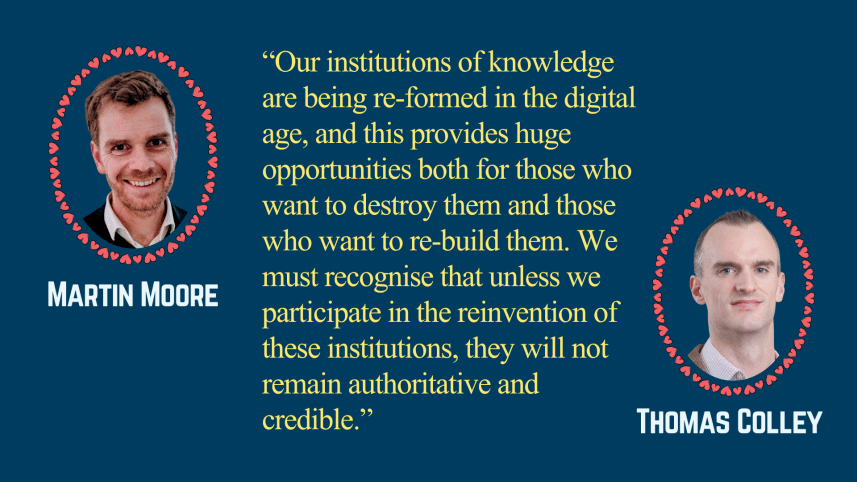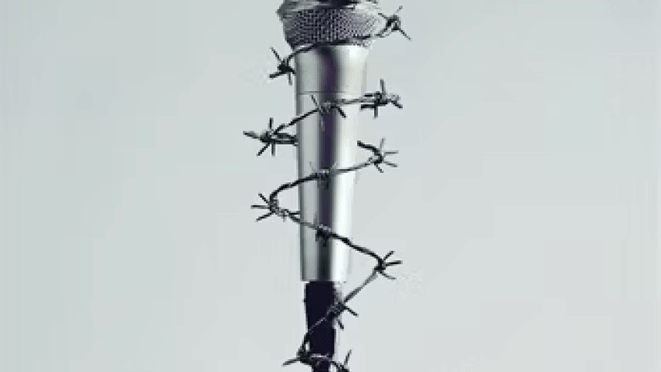‘The Fourth Estate will not survive unless defended’

Martin Moore and Thomas Colley, authors of Dictating Reality: The Global Battle to Control the News (2025), discuss how governments worldwide manipulate the media, reshape public perception, and construct competing realities in an age of digital disinformation. The interview was conducted by Shamsuddoza Sajen of The Daily Star.
Dictating Reality examines how states are reshaping the news to serve their political aims worldwide. What prompted you to explore this phenomenon, and how did your understanding of media control evolve throughout your research?
The idea of writing Dictating Reality came during our research into Russian and Chinese state media coverage of the 2020 US election. We wondered whether they would support or oppose Donald Trump's re-election and how they would cover his claims that Joe Biden's victory was fraudulent.
This was during the first year of the Covid-19 pandemic, which broadened our focus. With daily reporting about how governments were explaining their Covid responses (and non-responses), we started examining news in many more countries. We were struck by how many democracies were using authoritarian news control techniques—censorship, taking control of state media, attacking journalists, and limiting funding and access only to pro-government outlets.
We then found something more worrying: that more and more citizens disagree not just on the truth about things like Covid-19; they appear to be living in entirely different realities. Not only that, government efforts to control the news were central to how these alternative realities were spreading. In Russia, the government claimed that its full-scale invasion of Ukraine was to liberate it from fascism, rather than subjugate it. China was claiming that it is not the world's leading authoritarian state, but the world's leading democracy. Leaders like Donald Trump in the US or Jair Bolsonaro in Brazil peddled a version of reality in which they were the only ones who could save democracy from its enemies, while their opponents saw them as would-be tyrants seeking to destroy democracy. Dictating Reality documents how these leaders and governments try to influence the news to spread their parallel realities.

What underlying political or technological shifts have made this authoritarian turn in news possible in autocracies and democracies alike?
A major shift is a change in norms—that is, established behaviours—whereby more democracies are adopting authoritarian approaches to news. Previously, a White House press briefing would include leading American and international news outlets, even though the US government knew some outlets would criticise them, because holding power to account was recognised as the role of the press in a democracy. That idea is under threat. Now some of those outlets are banned by the Trump administration. Others it has sued. In the UK, successive governments have repeatedly questioned the impartiality of the public service broadcaster, the BBC, and reduced its funding.
Technology has not caused these changes, but it has contributed, because social media enables governments to bypass news outlets that might criticise them. Jair Bolsonaro ignored mainstream news outlets, and created his own (dis)information ecosystem on social media. He did not need mainstream media to win the presidency. Other leaders combine new technologies with older ones. India's Narendra Modi rarely does press conferences, instead using social media, and supportive news channels like Republic TV. Trump uses his platform, Truth Social, and old-school political rallies. These leaders use these tools to convince audiences that, to get the truth, they should just listen to their leader and ignore the news media (thereby avoiding challenge, scrutiny, and blame).
Your book describes how governments construct "alternative realities." How does this manipulation differ from traditional propaganda, and why do citizens believe these versions of reality even when evidence contradicts them?
There is a significant overlap, as we are essentially describing the spread of authoritarian propaganda techniques in democracies, accelerated by the technologies of the digital age. A classic example is how leaders like Donald Trump, Viktor Orbán of Hungary, or Narendra Modi claim their countries are threatened by a range of enemies (usually some combination of opposition politicians and ethnic minorities), and that they are the only ones who can save them from destruction. Stoking fear this way is a century-old propaganda technique. But the range of tools to spread these narratives has multiplied. Social media algorithms prioritise whatever content is most engaging, provocative, and popular. Fear-based messaging spreads more easily. Whether it is true is often irrelevant.
Why do people believe these versions of reality even when evidence contradicts them? First, because people may not be aware of the evidence, because their personalised information feeds, or the groups they join, do not engage with alternative perspectives. Secondly, they may not find the source credible. When Trump was asked why he attacks the press, he admitted that he does it so that when they criticise him, no one believes them. Third, because the stories these leaders tell are appealing. They present a simple view of the world and provide people with a sense of belonging. It is easier to blame a single ethnic minority for a country's problems than recognise the complex issues societies face. It is easier to believe a charismatic leader could save the nation rather than trusting in the messy democratic process. It is more appealing to believe your country is defending others, not attacking them; that your country is right and others are wrong.
Social media platforms are often blamed for amplifying misinformation. In your research, how do state strategies intersect with algorithmic systems—are governments adapting to exploit them, or are the platforms themselves complicit in creating echo chambers?
The political actors that get their versions of reality to dominate successfully exploit the technologies of the day. Social media algorithms, by prioritising engaging content over factual content, favour attention-grabbing over detail. They favour the controversial lie over the prosaic truth. While the effect of echo chambers should not be exaggerated, it is easier to create them than ever. In Brazil's 2022 election, Lula da Silva and Jair Bolsonaro's campaigns used WhatsApp groups to spread messages to their followers. Their campaign webpages listed thousands of groups citizens could join, and party administrators could feed them the latest message or meme. Platforms are complicit by being structured in a way that determines how information spreads, driven by their desire to maximise profit by maximising engagement. But for political success, what matters most is how governments use the media available to them. The same is true of generative AI, which is why countries like China are fighting to determine which AIs their citizens use. Control those, and one controls what version of reality citizens experience.
The book argues that the media's traditional role as a democratic watchdog is weakening. What does genuine resistance look like for journalists today, especially in countries where independent media face financial and political constraints?
It is easy to make recommendations from the sidelines while journalists face growing intimidation and harassment. Yet resistance remains crucial. There is still demand for high-quality, factual information. One of us lives in Latvia, which hosts several news outlets Russia expelled following its full-scale invasion of Ukraine. That such outlets continue to reach Russian audiences with fact-based journalism is very important. Support from networks of larger media outlets, and from democratic governments committed to media freedom, can help too.
Fact-checking is another area under severe financial threat, particularly since Meta and X deprioritised it. But even if fact-checkers struggle to keep up with the volume of disinformation produced online, political actors often stop spreading narratives once they have been debunked. Supporting such efforts remains important, even if removing disinformation from the internet is, as we write in Dictating Reality, like "trying to remove waste from the ocean with a teaspoon".
Finally, we must remember that the semi-constitutional role that journalists play as a "Fourth Estate" will not survive unless defended. We are grateful to journalists worldwide—many of whom we interviewed for this book—who continue to produce informative, critically-engaged journalism under threat of coercion. But we do not underestimate the challenge they face.
In practical terms, what can be done by media institutions, educators, and readers themselves to rebuild trust in journalism and resist state manipulation of truth?
We must recognise that our institutions of knowledge are being re-formed in the digital age, and that this provides huge opportunities both for those who want to destroy them and for those who want to re-build them. As civil society, we must recognise that unless we participate in the reinvention of these institutions, they will not remain authoritative and credible. Jonathan Rauch talks about the "constitution of knowledge"—the methods societies have developed over centuries to establish the truth (by which we mean what is knowable, public, and verifiable)—including through science, academia, the justice system, and journalism. Each is now under threat from authority figures who think that weakening them will enhance their own power. Rather than retreat from this threat, or align with those who are creating alternative realities, we need to work out how to reconfigure these institutions so they are fit for the age in which we live.
Follow The Daily Star Opinion on Facebook for the latest opinions, commentaries and analyses by experts and professionals. To contribute your article or letter to The Daily Star Opinion, see our guidelines for submission.




 For all latest news, follow The Daily Star's Google News channel.
For all latest news, follow The Daily Star's Google News channel.
Comments